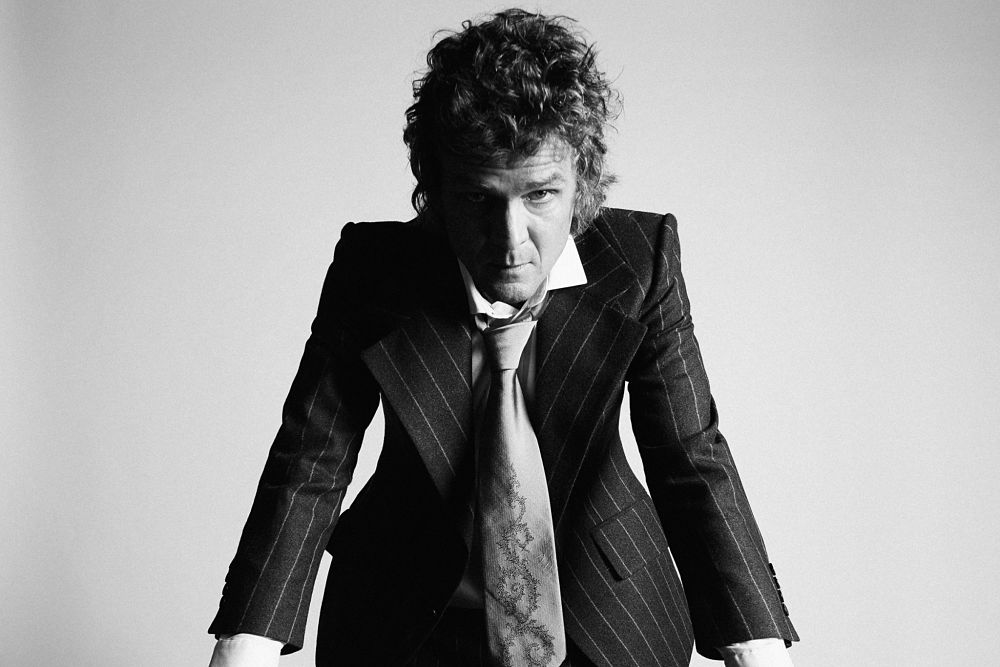“I get really nervous about the show and I get nervous about what I’m gonna say,” Brendan Benson says. The Michigan-born singer-songwriter has toured the country countless times without any notable battles with stage fright, but performing his songs live on the internet is a whole different beast. “It’s not like going on stage, it’s really different, it’s scary. Looking into that phone, looking into that lens, you’re opening yourself up to such scrutiny.”
With the April 24 release date of his first album for Third Man Records, Dear Life, days away, Benson should be prepping for a North American tour that was supposed to kick off this month. Instead, he’s at home in Nashville for the foreseeable future, quarantining with his family during the COVID-19 pandemic.
In a few hours, Benson will get in front of a camera and broadcast his daily Boy in a Bubble series of live-streamed solo performances on Instagram, a ritual that he’s taken up in lieu of the tour. At 4:20 pm CST every afternoon, he sits in front of a webcam, often with a joint sparked up, and plays a song, sometimes his own choice, sometimes picked by fans or even his wife. After shouting out fans tuning in everywhere from Denver to Argentina, he plays the 2002 fan favorite “Folk Singer.”
“It’s really kind of fun for me and a different kind of discipline,” Benson says of the performances. “It’s cool to look back, I’ve got this kind of a big repertoire of songs, like wow, I got a lot to choose from. I remember going on tour for my first record, and I had to play a couple covers because we only had like nine songs. It’s funny, just to think about then and now.”
Benson, who’s 49 and will turn 50 later this year, is proud of Dear Life as a dispatch from middle age, and it sounds more contented than the anxious and energetic twentysomething Benson who made his debut on 1996’s One Mississippi. “I’m a different person now. I’m sober, I’m a family man, I’ve got kids and the wife. And it’s a record that is pretty true to that, pretty honest about it and talking a lot about it.”
The brass-driven single “Richest Man” is as catchy as anything Benson has ever written, a big-hearted ode to his family with a chorus “I got twice the love and half the money/ And I feel like the richest man alive.” But the second chorus features a subtle nod to a less expected influence: he stutters out the words “I got, I got, I got, I got” in an homage to Kendrick Lamar’s 2017 hit “DNA.” When I mention the K-Dot reference on the song, Benson says “You’re the second person to find that!”
”I love rap because it’s filled with imagery, words and images. And that’s what I want in my music, I want more of that, and I’ve been guilty of not having enough of that,” Benson says. Dear Life’s title track is more character-driven than his usual autobiographical writing style, with each verse sketching out a different individual’s struggles, including an Iraq war veteran with PTSD. “I asked around for some opinions about that lyric. I was like ‘Does this sound cool to you, or does it sound weird that I would say this?’ And in the end, I thought, y’know, It’s new, and I like it. It’s cool, so I’m leaving it.”
Even if he never became a household name, Benson still has the charisma and rock star cheekbones of an aging classic rocker in the videos for Dear Life’s singles. He looks blithely amused by the animated effects in “Richest Man,” the way middle-aged bands used to come off when they had to start making promotional clips for MTV. The roller skating-themed video for “Good To Be Alive” even reminds me a bit of the old Dire Straits video for “Skateaway.”
Over the course of the last quarter-century, Benson has built up a formidable catalog of seven solo albums of jangly pop/rock with wry and personal lyrics, and three more as co-frontman of The Raconteurs with Jack White. His up-and-down trajectory was set by One Mississippi, which failed to meet the commercial expectations of Virgin Records. It became a word-of-mouth favorite that’s been reissued multiple times, including its first release on vinyl last December.
One Mississippi regularly shows up on lists of the greatest power pop albums alongside his heroes like Big Star, although Benson bristles at that tag. “I don’t like that label, of course, I never really did,” he says, worrying that it makes the music sound ‘expendable.’ “I’m never trying to just go, ‘Here’s just a simple power-pop ditty with some la la las.’ I aim higher, I guess.”
When Benson finally followed up One Mississippi with the 2002 indie release Lapalco, it outsold his major-label album, cementing a small, but fervent fanbase. “I had this cult following, and I kinda still do, I love it, it’s great. I have great fans, they’re really loyal,” he says. Benson’s longtime friendship with Jack White, a fellow Michigan native, also helped build up that cult. The White Stripes even covered the Lapalco track “Good To Me” on the B-side to their biggest single, “Seven Nation Army.”
In 2006, Benson and White released their first album as The Raconteurs, writing together and sharing lead vocal duties. Think of Benson as the Harry Nilsson to Jack White’s John Lennon, a respected niche artist who raised his profile as an esteemed collaborator with one of the biggest rock stars in the world. And when The Raconteurs topped the Billboard 200 for the first time last year with Help Me Stranger, it was Benson’s voice on prominent display on the album’s two highest-charting songs, the title track and “Now That You’re Gone.”
White’s Third Man Records has grown into a powerhouse label over the past decade, and people might wonder why it took this long for Benson to release an album on the label.
“Why didn’t I do this sooner? It’s so dumb! I think honestly, it might have been pride. Might have been, I wanna do this on my own, I don’t want the help,” he says.
His last two solo albums, 2012’s What Kind of World and 2013’s You Were Right, were released on his own label, Readymade Records. The hard lessons of running a label led to the prolonged break before his new album.
“I lost so much money on that label. And it’s a bummer because I gambled thinking that people would also like the kind of records that I liked, making records with Cory Chisel or the Howlin’ Brothers,” he says. “And my last record on that label, I think I’m just kind of not proud of that record.”
Though Benson is enjoying his daily Instagram mini-concerts and may continue them after the album release as he waits to reschedule the Dear Life tour, he’s more certain of his future as a producer than as a solo artist. He says that The Raconteurs are back “in Clark Kent mode” after winding down the Help Me Stranger promo cycle, but sounds more confident that there’ll be another Raconteurs album in a couple years than another Brendan Benson album.
“It’s just getting harder and harder to make money doing music. It’s messed up. I saw it happen in my lifetime. Had a record deal in the ‘90s, the money just flowed, I mean just millions of dollars. And then it just dried up,” Benson says with frustration. “I actually still enjoy this record, still listen to it, I’m really proud of it. And I’m hoping that a whole lot of people can hear it, that’s all that I’m really hoping for.”





